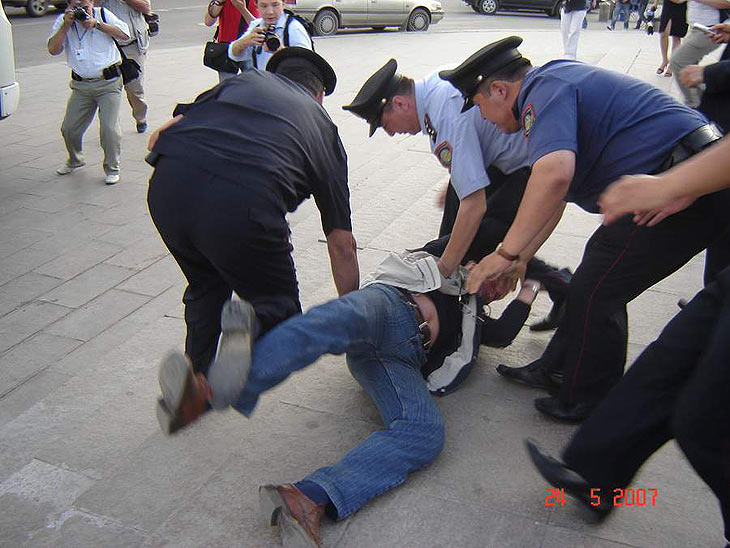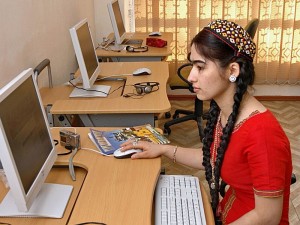 In connection with the visit of Minister of Foreign Affairs of Norway Jonas Gahr Støre and H.K.H. Crown Prince Haakon to Kazakhstan and participation in the opening of the Norwegian Embassy in Astana on 5 February 2010, the Norwegian Helsinki Committee made comments to minister Støre and stately secretary of the Oil – and Energy Ministry Robin Martin Kåss about the most central human medical challenges in Kazakhstan. Helsinki Committee’s office in Almaty is now under registration, and our activity in the region will be even greater if the registration will not face unforeseen problems.
In connection with the visit of Minister of Foreign Affairs of Norway Jonas Gahr Støre and H.K.H. Crown Prince Haakon to Kazakhstan and participation in the opening of the Norwegian Embassy in Astana on 5 February 2010, the Norwegian Helsinki Committee made comments to minister Støre and stately secretary of the Oil – and Energy Ministry Robin Martin Kåss about the most central human medical challenges in Kazakhstan. Helsinki Committee’s office in Almaty is now under registration, and our activity in the region will be even greater if the registration will not face unforeseen problems.
The embassy in Astana is going to be opened at a time when particularly Kazakhstan’s chairmanship in OSCE is central. In connection with the Presidency, Kazakhstan comes with concrete priorities for 2010 and is now in a position to be more receptive to constructive input from civil society and other participating states in the OSCE if it does want to meet expectations. As civil society in Kazakhstan is facing strong limitations, it is important that other participating states are conscious about their responsibility.
In White Paper nr.15 it comes out that "the petroleum industry and other Norwegian investments in countries with authoritarian regimes can be a challenge to our efforts for democracy, human rights and development." Kazakhstan is absolutely a country which falls into this category, and the chairmanship of the OSCE and the opening of a Norwegian embassy in the country is a good opportunity to try to get Norway’s work for democratization and human rights as a result of the large Norwegian investment in the petroleum industry.
There are several areas in Kazakhstan, which are worrying in a human rights perspective. First of all Kazakhstan has no political pluralism. It is a serious complaint that the country which at the moment chairs the OSCE allows no political opposition to develop themselves, which is forced to work within the limitations of freedom of speech and freedom of assembly and false accusations and arrests in order to avoid criticism of the incumbent government. Helsinki Committee has identified some key reasons for concern which is related to human rights situation in Kazakhstan. Here are the brief points.
Tolerance  Kazakhstan has made tolerance of religious and ethnic diversity to one of its main priorities under the chairmanship of the OSCE. Minister of Foreign Affairs Saudabayev expressed this clearly in his speech to the permanent council 14 January: "Given our extremely positive experience in securing inter-ethnic and interconfessional harmony in our own country, we intend to make tolerance and intercultural dialog within the OSCE area a major priority of our Chairmanship."
Kazakhstan has made tolerance of religious and ethnic diversity to one of its main priorities under the chairmanship of the OSCE. Minister of Foreign Affairs Saudabayev expressed this clearly in his speech to the permanent council 14 January: "Given our extremely positive experience in securing inter-ethnic and interconfessional harmony in our own country, we intend to make tolerance and intercultural dialog within the OSCE area a major priority of our Chairmanship."
This is in stark contrast to reports from the country that religious minorities get a disproportionately severe punishment of administrative violation, are exposed to abuse from the local power bodies and systematic misinformation and black paint in the media without any opportunity to make statements.
In addition, the Kazakh government tried in 2009 to get through a bill that would make it even more difficult for religious minorities in Kazakhstan. Probably the bill comes back during the OSCE chairmanship.
The messages are coming that the ethnic minorities are also exposed to discrimination and abuse. An example is the killing of three Chechen brothers in a village outside of Almaty in March 2007 in police presence.
Criminal justice system
Kazakh legal system is exposed to great pressure to find the defendant guilty. Kazakh defence lawyers are also exposed to intimidation and proceedings, where they can lose license because of fabricated accusations.
It is very difficult for an accused to have the defence lawyer he wants, because the national security bodies restrict a defence lawyer’s right to be involved in a case on the grounds that he did not have access to state judge. This is not something demanded, according to Kazakh legislation, but that still is used to limit action of their advocates.
As a chair of the OSCE Kazakhstan should especially respect the international agreements they have signed themselves that regulate legal status of advocates.
The case against Evgeniy Zhovtis, right, the outspoken director of the Kazakhstan International Bureau for Human Rights and Rule of Law, is also an example of how the justice system is often used in political context. Zhovtis was sentenced to four years in prison for vehicular manslaughter after a trial in which Zhovtis did not know that his status as a witness was changed to the suspect until it was too late to demand alternative expertise, desired fixes from the defence were consistently rejected, evidence of transmission was inadequate, and the judge came back from the chamber after 20 minutes with a long pre-written court decision after giving the defence only 40 minutes to prepare their closing procedure.
Zhovtis has not denied that he was guilty of a young man’s death, but according to him the tragic event is used to prevent his activities as a human rights activist. Also the victim’s mother said that she did not have any claim against Zhovtis, but this was not emphasized in the court. Zhovtis is now imprisoned in a camp far from some major cities in Kazakhstan, difficult to access.
Freedom of speech and freedom of assembly
It is increasingly difficult for the Kazakh civil society to reach the public. A new law concerning internet makes that all statements on the Internet, even on a private blog, is considered as the media, and thus possible to sue for defamation. It is connected with several cases when corruption and breaches of environmental legislation have been discovered within banks and enterprises that are affiliated with the government.
 Opposition newspaper “Respublika” was imposed to great damages after being sued by BTA Bank for defamation, and is now published only in a primitive version with small letters.
Opposition newspaper “Respublika” was imposed to great damages after being sued by BTA Bank for defamation, and is now published only in a primitive version with small letters.
Two journalists have been killed in the end of the year. Larger or smaller groups which want to demonstrate in the major urban centres face problem to get permission for this, and several have been arrested or fined large fines in connection with peaceful demonstrations in Almaty.
Under such conditions it is not possible for a civil society to function, and it stands in stark contrast to Kazakhstan’s promises as chairman of the OSCE to respect the basic principles of the OSCE.
The Norwegian Helsinki Committee hopes that both foreign minister and state secretary in the Ministry of Petroleum and Energy Ministry may take up some of these themes in conversation with the Kazakh government and enterprises in Kazakhstan, and to remind about the commitments of the Presidency of the OSCE.
Religion and racist violence
Recently the Helsinki Committee together with the Oslo Center for Peace and Human Rights by Kjell-Magne Bondevik in Astana discussed religious freedom in the country. Forum 18 types in cooperation with the Helsinki Committee, Oslo Center, The Oslo Coalition on Freedom of Religion or Belief and the Norwegian Mission to the East prepare a report on religious freedom in Kazakhstan and Kyrgyzstan. The report focuses particularly on the conditions for so called "non-traditional" religious groups. Non-traditional are regarded those who are not Sunni Muslims or Orthodox Christians. The report will be launched in Vienna in February.
These groups have difficulty getting through the compulsory registration, missionary activities are punished severely, they are exposed to fabricated charges as a result of the raid by the security police (KNB), and have great difficulty with normal operation.
Penalties for these administrative breaches are disproportionately severe, such as suspension of the group’s religious activity or large fines. Members of the Muslim groups have been arrested and sentenced to long prison sentences for extremism or terrorism.
Various religious groups are called "sects" in both the media and the president himself. For example, there were identical articles on dangerous sects which were published in several newspapers, signed by various persons from newspaper to newspaper.
The main challenge is that the president and other high standing officials are talking to the international community on inter-religious understanding in Kazakhstan, while there are cases of discriminatory attitudes and direct attacks on religious minorities.


